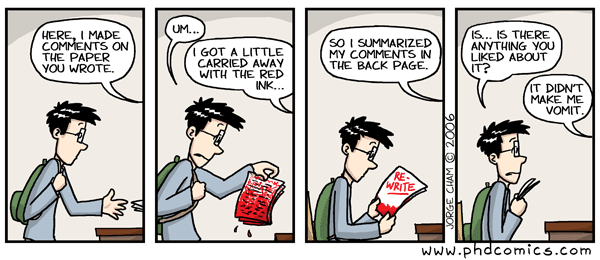How to Mark a Student Paper Like a Pro (Only Better) - Brian Wasko
I got up bright and early on Saturday morning to make it to this 8:30 AM seminar by Brian Wasko of Write At Home which offers online writing classes. I've heard Brian speak before and enjoyed it very much. Since I teach writing classes, I thought I'd see if there were any tips or tricks Brian could share that would help me out, or at least this would let me know I'm doing things correctly.The worst place to learn stuff is a school.
 The average time to mark up an essay is 20 minutes. If a teacher has 150 students (as many teachers in schools do), that is 50 hours of grading time for just one essay. No wonder teachers don't assign enough writing!
The average time to mark up an essay is 20 minutes. If a teacher has 150 students (as many teachers in schools do), that is 50 hours of grading time for just one essay. No wonder teachers don't assign enough writing!Brian doesn't like the word "grade" as in "grading essays." He prefers to say "mark up" the essay since it has more of a connotation of helping kids with their writing.
Basic Paper-Marking Principles
- Ink color doesn't matter.
- Use a pen, but talk too. (Mark it up first.)
- Think "process" (multi-step) Three drafts is often appropriate.
- First draft emphasis is on larger issues. What is the paper saying? Get the big picture.
- Read it through once without marking anything.
- Limit corrections. Pick your battles. Avoid the "it makes me nuts" attitude. Leave mistakes unmarked sometimes. We're only working on a few things at once.
- Good writing is more than grammar: Content, style, substance, mechanical
- There is no answer key for writing.

Four Comment Types
Learn to find something positive.
Editing "hurts".
Students may not be conscious of the good things in their writing.
Sincerity matters.
2 - Corrective/Directive Comments
Watch out for just noting "vague".
Offer suggestions. Prefer two suggestions.
Use complete sentences. (He doesn't like the comment 'frag'.)
3 - Relational/Responsive Comments
Watch for tone.
Responding to content shows you care and you are "hearing" the student.
Interact!
4 - Summary Comments or Evaluation/Scores
"Sandwich" method (something positive, something directive, something positive)
Brief paragraph of comments.
Brian showed some student papers on the screen that he asked the audience to comment on which was a fun exercise. Then he opened up the floor for questions.
Q - Once the marking occurs, do you recommend a particular rubric?
A - Six Traits rubrics
Don't get bogged down in rubrics because of multiple items in the checklist.
Customize rubrics. Weight the categories according to what you are working on.
Q - What types of assignments does Write At Home give?
A - Four modes - Narrative, Descriptive, Expository, Persuasive
Q - What is important in a writing curriculum?
A - Two approaches: Copywork/Dictation model or "Get Creative" model
I was pleased with this workshop because it confirmed for me that I am doing many things correctly as I evaluate and assess my students' writing. I disagreed with Brian on a couple of points and was encouraged to try a couple of new things as I mark up student writing in the future.
Great seminar!

